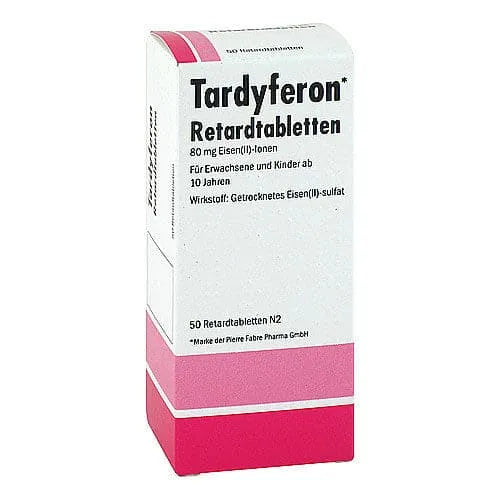EMRA-MED Pharmaceuticals GmbH
Oral anti-anemic, Iron(ii) sulfate 80 mg prolonged release tablets
Oral anti-anemic, Iron(ii) sulfate 80 mg prolonged release tablets
Regular price
£39.13 GBP
Regular price
£50.00 GBP
Sale price
£39.13 GBP
Unit price
per
Tax included.
Shipping calculated at checkout.
Couldn't load pickup availability
TARDYFERON Depot-iron(II)-sulfate 80 mg sustained-release tablets, Oral anti-anemic
Pack size:50 pcsDosage form:Sustained-release tablets
TARDYFERON, Iron deficiency, Depot iron (II) sulfate 80 mg prolonged-release
Dosage form: Extended-Release Tablets
Active ingredient: Depot iron (II) sulfate
Areas of application:
Therapy of iron deficiency conditions
For use in cases of iron deficiency.
Active ingredients
- 247.25 mg iron(II) sulfate, dried
ingredients
- Maltodextrin
- Iron(III) oxide, red
- Iron(III) oxide hydrate, yellow
- Triethyl citrate
- Ammonium methacrylate copolymer (Type A)
- Ammonium methacrylate copolymer (Type B)
- Cellulose, microcrystalline
- Glycerol dibehenate
- Sepi film LP 010
- Titanium dioxide
- talc
Indication :
- Iron preparation with blood-forming effects (antianemic). Used to treat iron deficiency conditions.
Dosage :
- Always take the medicine exactly as directed. Please ask your doctor or pharmacist if you are not sure.
-
Unless otherwise prescribed by the doctor, the usual dose is:
- For mild iron deficiency, swallow 1 prolonged-release tablet whole with a little water before breakfast. For severe iron deficiency, take 1 extended-release tablet in the morning and evening, approximately 1 hour before meals. After 3 weeks, the dose can be reduced to 1 prolonged-release tablet once a day.
- The duration of intake depends on the type and severity of the iron deficiency. To replenish iron reserves, you should continue taking 1 extended-release tablet daily in the morning before breakfast for 1 - 3 months after the values have normalized.
- Please talk to your doctor or pharmacist if you have the impression that the effect is too strong or too weak.
-
If you have taken more than you should
- If the medicine has been taken in large quantities, the doctor should be informed immediately.
-
If you forget to take it
- Do not take a double dose if you forget to take the previous dose.
- If you have any further questions about using the medicine, ask your doctor or pharmacist.
Way :
- For mild iron deficiency, swallow 1 prolonged-release tablet whole with a little water before breakfast.
- For severe iron deficiency, take 1 extended-release tablet in the morning and evening, approximately 1 hour before meals.
Side effects :
-
Like all medicines, this medicine can cause side effects, although not everyone gets them.
-
The frequency information on side effects is based on the following categories:
- Very common: more than 1 in 10 people treated
- Common: less than 1 in 10, but more than 1 in 100 people treated
- Uncommon: less than 1 in 100, but more than 1 in 1,000 people treated
- Rare: less than 1 in 1,000, but more than 1 in 10,000 people treated
- Very rare: less than 1 in 10,000 people treated
- Not known: Frequency cannot be estimated from the available data
-
The frequencies of all side effects listed below cannot be estimated based on the available data.
-
Possible side effects:
- Gastrointestinal problems or constipation may occur. The darkening of the stool that occurs during treatment is harmless. Allergic skin reactions may occur.
-
Possible side effects:
-
The frequency information on side effects is based on the following categories:
- Please inform your doctor or pharmacist if any of the side effects listed seriously affects you or if you notice side effects that are not listed.
Interactions :
-
When taken with other medicines:
-
Please inform your doctor or pharmacist if you are taking or have recently taken any other medicines, even if they are non-prescription medicines.
- Iron salts reduce the absorption of tetracyclines, penicillamine, gold compounds, levodopa and methyldopa.
- Iron salts affect the absorption of quinolone antibiotics (e.g. ciprofloxacin, levofloxacin, norfloxacin, ofloxacin).
- Iron salts reduce the absorption of thyroxine in patients receiving replacement therapy.
- The absorption of iron is reduced by the simultaneous use of cholestyramine, antacids (Ca 2+ , Mg 2+ , Al 3+ salts) and calcium and magnesium supplements.
- The simultaneous intake of iron salts with salts of salicylic acid (salicylates, e.g. acetylsalicylic acid) or non-steroidal anti-inflammatory drugs can increase the irritating effect of iron on the mucous membrane of the gastrointestinal tract.
- Iron-binding substances such as phosphates, phytates or oxalates as well as milk, coffee and black tea inhibit iron absorption.
- The medicine should not be taken within 2 - 3 hours after administration of any of the above substances.
-
Please inform your doctor or pharmacist if you are taking or have recently taken any other medicines, even if they are non-prescription medicines.
-
Take with food and drinks:
- Ingredients from milk, coffee, black tea and vegetarian food inhibit the absorption of iron and should therefore not be taken at the same time as the medicine.
Contraindications :
-
Must not be taken:
- if you are hypersensitive (allergic) to iron (II) sulfate or any of the other ingredients.
- in cases of iron overload (e.g. iron storage disease) and iron utilization disorders (lead anemia, sideroachrestic anemia, thalassemia).
- of children under 10 years.
Pregnancy and breast feeding period :
- Before taking/using any medicines, ask your doctor or pharmacist for advice.
- If you are pregnant, you should only take this medicine if your doctor has diagnosed you with iron deficiency. Treatment with the high dosage of 2 prolonged-release tablets per day should not be carried out over a longer period of time.
- If you are breast-feeding, you should only take this medicine as directed by your doctor.
Patient information :
-
Take special care when taking:
- if dietary or other iron salt supplements are used to avoid the risk of possible iron overdose.
- In the case of pre-existing inflammation or ulcers of the gastrointestinal mucosa, the benefits of treatment should be carefully weighed against the risk of worsening the gastrointestinal disease.
- Children: Medicines must not be used in children under 10 years of age.
Materials
Materials
Shipping & Returns
Shipping & Returns
Dimensions
Dimensions
Care Instructions
Care Instructions


